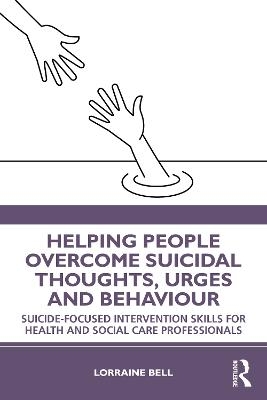
Helping People Overcome Suicidal Thoughts, Urges and Behaviour
Routledge (Verlag)
978-0-367-56645-6 (ISBN)
The book provides a framework and outlines skills for anyone working with adults who present with suicidal thoughts or intent. Part 1 introduces a basic understanding of our knowledge about suicide and UK policy; Part 2 outlines the research into the treatment of suicidality and the general principles for working in the safest possible way. Part 3 outlines ten key psychological skills in the context of evidence-based best practice. The book also discusses the role of health and social care professionals in the prevention of suicide in the context of Covid-19.
The book will be a valuable addition to the resources of professionals including psychotherapists, nurses, social workers, occupational therapists, prison and probation officers, drug and alcohol workers, general practitioners and support staff in any health or social care context.
Lorraine Bell is a Consultant Clinical Psychologist with Solent NHS Trust, fellow of the British Psychological Society and leads the Psychological Therapies Service in secondary mental health for Portsmouth. She is also the Suicide Prevention and Dialectical Behavior Therapy lead for the Trust.
Part 1 Understanding suicide and risk; 1.1 Suicide statistics and UK Policy; 1.2 Definitions; 1.3 Stigma and common myths about suicide; 1.4 From thought to contemplation to preparation to action; 1.5 Help seeking and barriers to help seeking; 1.6 Suicide and mental health; 1.8 Risk and protective factors; 1.9 Models of suicide; 1.10 Intervening to help people at risk of suicide – who, where and when; Part 2 Safety and treatment planning principles; 2.1 Suicide-focussed interventions and protocols from research; 2.2 Providing a suicide focused intervention alongside other levels of intervention for people with different levels of risk; 2.3 Coming alongside: Cultivating a trusting relationship and engaging the client; 2.4 Assessing risk; 2.5 How many sessions?; 2.6 Agreeing a treatment plan or SFI; 2.7 Working with families and partners; 2.8 Identifying direct and indirect drivers; 2.9 Planning and pacing the SFI; 2.10 Building skills and coping strategies and shaping effective help-seeking; 2.11 Ending the intervention; 2.12 Training, support and supervision for staff; Part 3 Key suicide intervention skills; 3.1 Validation; 3.2 Chain or functional analysis of suicidal behaviour; 3.3 Safety planning: Promoting adherence to the plan; 3.4 Reducing access to means and ‘shaping’ skilful behaviour including appropriate help-seeking; 3.5 Exploring ambivalence, reasons for living and reasons for dying; 3.6 Problem solving; 3.7 Building positive experiences and a life worth living: Working with needs, values and goals; 3.8 How to make and use a hope box; 3.9 Building mindfulness and mindfulness-based skills; 3.10 Telephone coaching
| Erscheinungsdatum | 06.04.2021 |
|---|---|
| Zusatzinfo | 12 Tables, black and white; 6 Line drawings, black and white; 6 Illustrations, black and white |
| Verlagsort | London |
| Sprache | englisch |
| Maße | 156 x 234 mm |
| Gewicht | 317 g |
| Themenwelt | Medizin / Pharmazie ► Medizinische Fachgebiete ► Psychiatrie / Psychotherapie |
| Medizin / Pharmazie ► Pflege ► Ausbildung / Prüfung | |
| Sozialwissenschaften ► Soziologie | |
| ISBN-10 | 0-367-56645-1 / 0367566451 |
| ISBN-13 | 978-0-367-56645-6 / 9780367566456 |
| Zustand | Neuware |
| Haben Sie eine Frage zum Produkt? |
aus dem Bereich


